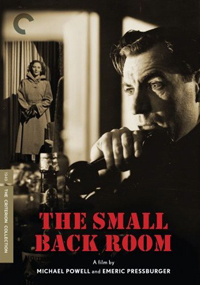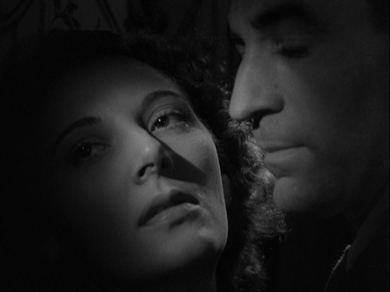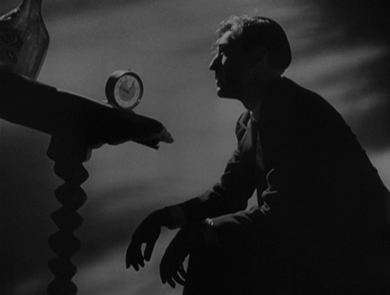| Release List | Reviews | Price Search | Shop | Newsletter | Forum | DVD Giveaways | Blu-Ray/ HD DVD | Advertise |
| Reviews & Columns |
|
Reviews DVD TV on DVD Blu-ray International DVDs Theatrical Reviews by Studio Video Games Features Collector Series DVDs Easter Egg Database Interviews DVD Talk TV DVD Talk Radio Feature Articles Columns Anime Talk DVD Savant HD Talk Horror DVDs Silent DVD
|
DVD Talk Forum |
|
|
| Resources |
|
DVD Price Search Customer Service #'s RCE Info Links |
|
Columns
|
 |
The Small Back Room |

|
The Small Back Room Criterion 441 1949 / B&W / 1:33 flat full frame / 107 min. / Hour of Glory / Street Date August 19, 2008 / 39.95 Starring David Farrar, Kathleen Byron, Jack Hawkins, Milton Rosmer, Cyril Cusack, Emrys Jones, Michael Goodliffe, Sidney James, Leslie Banks, Michael Gough, Geoffrey Keen, June Elvin, Anthony Bushell, Renée Asherson, Robert Morley Cinematography Christopher Challis Production Design Hein Heckroth Film Editor Clifford Turner Original Music Brian Easdale Written by Michael Powell & Emeric Pressburger from a novel by Nigel Balchin Produced and Directed by Michael Powell & Emeric Pressburger |
For most Americans English film history skips from Alfred Hitchcock straight to the 60s British New Wave directors, with only a few interesting highlights in between. But England went through its own cinematic hangover in the postwar years, with both the public and the censors chafing against dark thrillers and dramas with somber, sometimes despairing moods. Violent Brit Noirs like Brighton Rock and It Always Rains on Sunday rubbed shoulders with moody thrillers like Counterblast and Seven Days to Noon, perhaps the first movie about atomic blackmail. After their glossy Technicolor triumphs of the late 1940s, Michael Powell & Emeric Pressburger took on a tiny B&W drama about wartime tensions. Like all of the films from the Archers, The Small Back Room overachieves mightily; it's a nearly perfect portrait of people under pressure in a specific time in history.

Michael Powell & Emeric Pressburger always defied expectations. Their wartime movies ignore the usual formula for patriotic propaganda. The Life and Death of Colonel Blimp favors a German character as noble and good, and hints that the British Army is being run by stuffy holdovers still fighting WW1. A Canterbury Tale finds plenty of weird goings-on in the wartime countryside, and presents an authority figure who appears to be a mild pervert. Yet Powell & Pressburger's films remain more memorable than most of the big patriotic shows about valiant fighting men.
It's been said that Powell & Pressburger capture the spirit of the British character, which is perhaps why American distributors sometimes asked for cuts and re-shoots for Yank audiences that wouldn't know or care what a "Land Girl" was. Specific "English" issues form the core of The Small Back Room, which makes the petty rivalries of war effort the background for an intense drama about personal responsibility. Powell & Pressburger's bureaucrats persist in feathering their own nests and extending their personal dominions. The fact that a war is on doesn't seem to make a difference. As in their I Know Where I'm Going!, The Archers are merciless in their criticism.
Sammy Rice attends a demonstration of a new anti-tank gun; his job will be to evaluate its readiness for production. Colonel Holland can't get the attention of the research chiefs, who instead answer to various ministers and sub-ministers. The complaining Holland at first reminds us of the Colonel Blimp character, an older soldier with a big moustache and a direct, gruff manner.
Slowly we realize that Holland is in the right, that war research shouldn't be fractured into a hundred fiefdoms with bureaucrats in charge instead of soldiers, and he. In a large meeting to evaluate the gun, Mair and another big Boffin waste time on turf warfare instead of the issue in question. 1 \
Mair doesn't run a very tight ship. His lab is a disorganized mess, with talented staffers like Rice and Till (Michael Goodliffe) wasted on detail work. Young Corporal Taylor, a brilliant man with fuses (Cyril Cusack) is relegated to stoop 'n' fetch status. Another employee is forever talking to his girlfriend on the phone. The entire lab shuts down to put on a humiliating Dog 'n' Pony show for a visiting minister (Robert Morley), an idiot who thinks an adding machine is a new invention. Secretary Susan hates seeing Sammy overshadowed by the obnoxious bureaucrat Waring, who doesn't care about anything except his "sales record." Susan wants Sammy to go for a position of authority, but he has no faith in himself.
The Small Back Room is a great movie for anyone in a defeatist or depressed mood. Sammy Rice must take painkillers for his injured foot and becomes irritable at almost everything, from Waring's insults to the chitchat of the giddy night-clubber Gillian (June Elvin). He picks a fight with his bartender (Sidney James) and behaves terribly toward the understanding Susan. Underneath his bitterness Rice is supremely competent; the country needs his contribution. He volunteers to help the gallant Dick Stuart with his booby-trapped bombs, and learns to confront his self-pity. The bomb disposal ordeal is one of Powell & Pressburger's most impressive suspense scenes.

Kathleen Byron and David Farrar made wonderful impressions in Black Narcissus. Here they're an intense, understated couple almost living together out of wedlock. At first we think that Susan is nagging Sammy. Then The Archers stage an expressionist nightmare that begins with Sammy alone in his room contemplating a bottle of whiskey. If Powell's bizarre visuals aren't completely overpowering, it's because Billy Wilder had already been there four years before in The Long Weekend.
Neither actor became a huge star, which only makes catching their performances in scattered films all the more of a thrill. Cyril Cusack is excellent as the worried Taylor, suffering from a nervous tic. Michael Gough is also a standout as the Captain keen on defusing bombs. Actor-director Anthony Bushell (The Terror of the Tongs) is an officer who works with Rice through the bomb scene, along with Renée Asherson's radio operator.
Powell & Pressburger's films overflow with unique personalities and experiences. The Small Back Room is a "small" movie with a big emotional kick, like Robert Parrish's The Purple Plain.
Criterion's The Small Back Room is another superior Michael Powell & Emeric Pressburger disc produced by Karen Stetler. The transfer is immaculate, reproducing Christopher Challis' mood lighting as well as the hazy expanse of Portland Bill where the mystery bomb is discovered. For some reason the gun test takes place right in the middle of Stonehenge.
Charles Barr provides the audio commentary, and a new interview with cinematographer Challis uncovers a wealth of interesting information about Room and other British classics. Michael Powell's dictations about the film for his autobiography are presented as another extra. Nick James is the author of the insert booklet essay.
On a scale of Excellent, Good, Fair, and Poor,
The Small Back Room rates:
Movie: Excellent
Video: Excellent
Sound: Excellent
Supplements: Commentary, interview, audio dictation, insert essay
Packaging: Keep case
Reviewed: August 13, 2008
Footnote:
1. Emeric Pressburger was a writer on Operation Crossbow. In it, a puffed-up English scientist (Trevor Howard) scoffs at the idea of Nazis making rocket super-weapons, and his hubristic attitude almost convinces the high brass that there's nothing to fear. This is a different kind of resentment against scientists than that seen in American movies. In our Sci-Fi pictures, scientists frequently take the blame for the way politicians and generals use their new discoveries.
Return
Reviews on the Savant main site have additional credits information and are more likely to be updated and annotated with reader input and graphics.
Review Staff | About DVD Talk | Newsletter Subscribe | Join DVD Talk Forum
Copyright © MH Sub I, LLC dba Internet Brands. | Privacy Policy | Terms of Use
Subscribe to DVDTalk's Newsletters
|
| Release List | Reviews | Price Search | Shop | SUBSCRIBE | Forum | DVD Giveaways | Blu-Ray/ HD DVD | Advertise |





